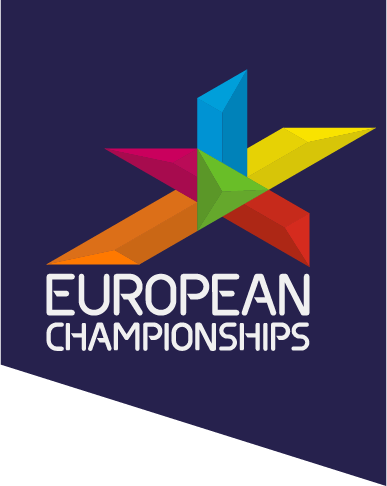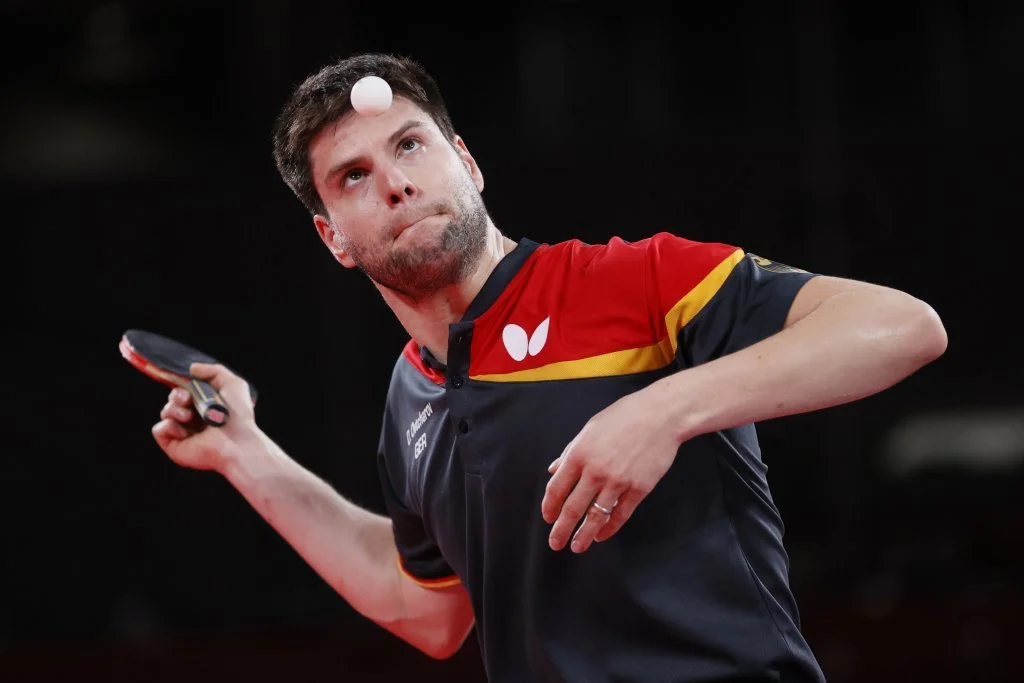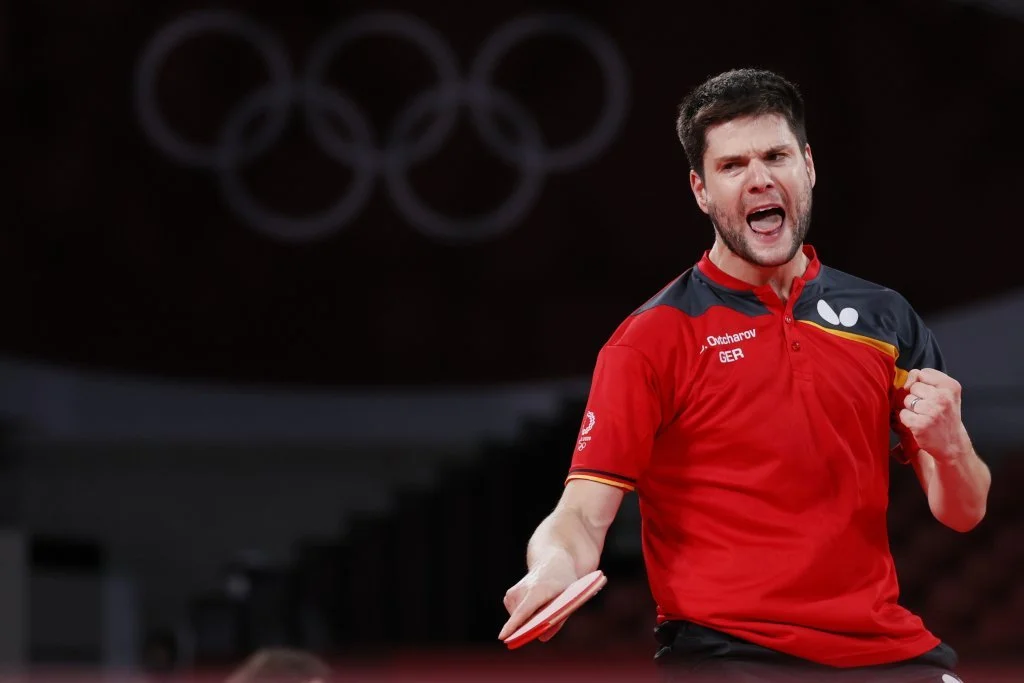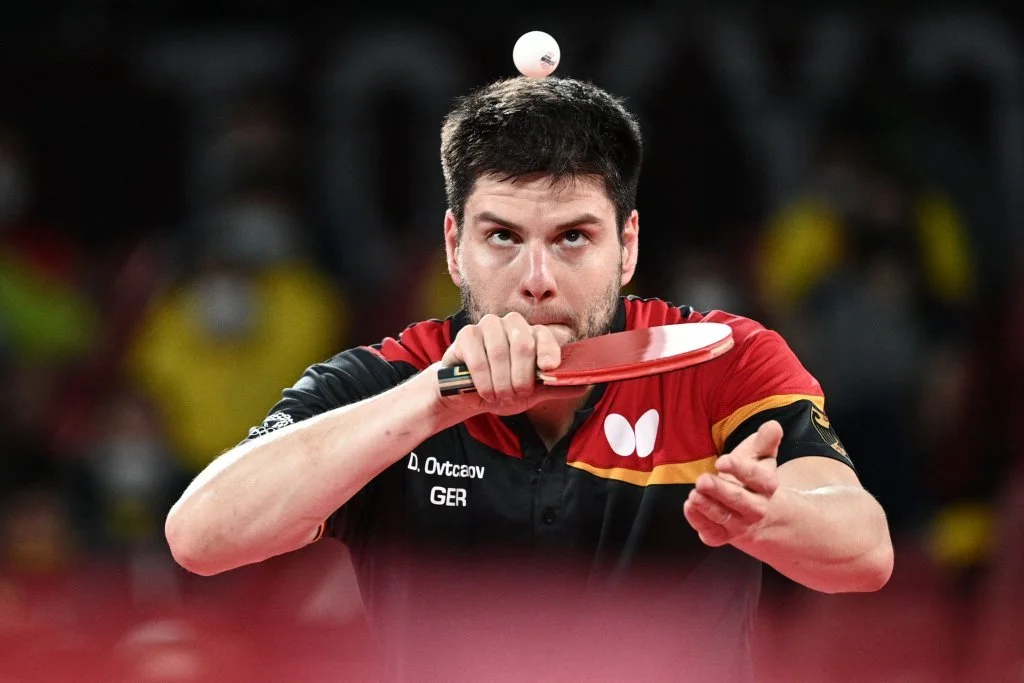Table Tennis is a Family Affair for Dima Ovtcharov
The apple doesn't fall far from the tree, does it? Professional table tennis player Dimitrij Ovtcharov proves this thesis, his daughter however does not. Because the six-year-old girl likes many things, other than playing table tennis. "When we play together, it's only for two or three minutes, then she wants to go back to gymnastics or dancing," says the Olympic medallist in the interview and laughs: "The interest is very low, and I don't necessarily see her playing table tennis. The 33-year-old, on the other hand, takes after his father.
Born in Kiev in 1988, he came to Germany with his parents in 1992. His father Mikhail was the Soviet individual table tennis champion in 1982 with 80 appearances in the national team. In the early nineties, he played for the second-division team Schwalbe Tündern, a district of Hameln in Lower Saxony. But his mother Tatjana, who holds an A-licence coaching certificate, also encouraged the young Dimitrij early on. Especially since his father didn't have much patience with his son in the beginning.
© Steph Chambers/ Staff/ Getty Images
"It was only when I was about nine years old that my father coached me," says Ovtcharov. Initially, he had it in mind that his son would earn a little extra money with the sport in addition to his studies or school. As a schoolboy, "Dima", as he is called by his friends, actually wanted to deliver newspapers, which would have brought him 50 German marks. "Nobody expected that I would do so well playing table tennis," he admits. To this day, his father is his most important advisor. He would never make an important decision without him.
The joint family effort bore fruit: Dimitrij Ovtcharov, who now lives in Düsseldorf, is considered one of the best table tennis players in the world, winning six medals for Germany in four Olympic participations. His current rankings: number one in Germany, third in Europe, number seven in the world. "I have found so much joy in the successes I have worked so hard for," says Ovtcharov.
That makes it all the harder to lose, he says. Probably the worst defeat of his career so far came in the summer of 2021 at the Olympic Games in Tokyo. Ovtcharov lost against the Chinese Ma Long in the semi-finals, the best player in the world, with 9:11 in the seventh set. His dreams of gold were shattered with the last ball caught by the net, in the end it was bronze. He almost did not take part in the bronze medal match, but his father had to talk him into it.
© Steff Chambers/ Staff/ Getty Images
ROUGH PATH TO MUNICH 2022
In retrospect, however, that was only the start of an eventful period. A few months after his Olympic defeat, he twisted his ankle and needed surgery. As a result, he missed the World Championships in the USA. In February this year, he reinjured his ankle, had to take another break and go through the rehabilitation process again. "Rehab means a lot of patience," he says: "Especially in the beginning, when you can't move much yet, sit at home a lot, walk on crutches, that's very depressing for someone who is otherwise always on the move."
At the same time, Ovtcharov saw a war break out in his country of birth, organised the escape of his 85-year-old, sick grandmother and helped other refugee families to start over in Düsseldorf. In April he terminated his contract with the Russian club Gazprom Fakel Orenburg, where he had played successfully for 12 years.
TABLE TENNIS SUPERSTARS
In the ZDF Sportstudio in May, he then sadly reported on the death of his grandmother and at the same time commented on his departure from Russia: "It was clear that it could no longer continue in Orenburg, because you have to take a clear position," said the 33-year-old: "It hurt me from a sporting point of view, but sport has unfortunately become political."
There was hardly any time to take a deep breath in the past months, so the focus back on sport came just in time. First, he needed a new club. He landed at the club that the SZ called "The best 1b in the world": Ovtcharov is under contract with the first-division club TTC Neu-Ulm, which signed four world-class players for the Champions League season: In addition to the player from Düsseldorf, 20-year-old Truls Möregårdh, for example, who "is one of the up-and-coming young stars," says Ovtcharov. The Swede is the current number one on the European ranking list.
But at the moment he is being interviewed in Munich, with the venue of the European Championships behind him, the Rudi-Sedlmayer-Halle, designed like an arena, a table tennis table in the middle surrounded by thousands of seats. "I would love to start playing right away," says Ovtcharov with a broad grin. "I'm very happy that the European Championship is in Germany and then in Munich, one of my favourite cities," he adds.
© Anne-Christine Poujoulat/ Kontributor/ Getty Images
NINE SPORTS UNDER ONE ROOF
And he also thinks the multi-sport format is great, it has something "of a mini-Olympics or the European Games, where you also get an insight into other sports," he says. Triathlon is something he would like to try out after his table tennis career. "I've already met Jan Frodeno a few times, fascinating sport," he says. He also likes beach volleyball because, unlike table tennis, you play outside in the sunshine. You get good feelings when you're in the sun and competing for medals.
He also has positive feelings when he thinks about his family, his wife, the former Swedish national youth table tennis player Jenny Mellström, and his children. He recently became a father for the second time, this time a son. That immediately stirs the imagination: Could his son perhaps be the offspring that takes after his father, the apple that stays close to the tree?
In any case, youth development is very important to him, as he emphasises in the interview. He sees it in his daughter. "I often take her to the gym for training. Then I set up a few exercises for her, and she tries gymnastic tricks. Afterwards she is always happy and balanced," says Ovtcharov. As a young athlete, one is very dependent on support, which helped him a lot during his school years. Therefore, he says, it is an honour for him to also support the Munich 2022 project Future Class of 22. "In the end, young talent is our future," says Dimitrij Ovtcharov. A sentence that resonates.
In our Future Class of 22 project, children and young people can follow in the footsteps of their great role models and get a taste of the European Championship themselves. Do you want to serve on the same sand as Sandra Ittlinger and Clemens Wickler? Play table tennis in the Rudi-Sedlmayer-Halle? Munich 2022 makes it possible!



